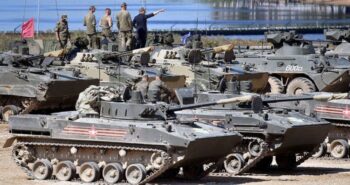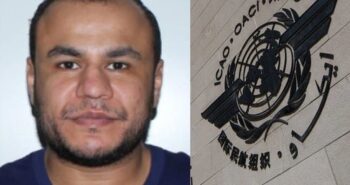By Jared Malsin & Benoit Faucon

 Khalifa Haftar, at one time backed by the CIA, owns millions in U.S. real estate, assets that are being pursued by victims of Libya’s bloody civil war.
Khalifa Haftar, at one time backed by the CIA, owns millions in U.S. real estate, assets that are being pursued by victims of Libya’s bloody civil war.
Three lawsuits filed in the U.S. earlier this year accuse Khalifa Haftar of war crimes during Libya’s civil war.
Since the two decades he spent in the U.S. after leading a CIA-backed campaign against the regime of Libyan strongman Moammar Gadhafi in the 1980s, militia leader Khalifa Haftar amassed millions of dollars in properties and other assets, including a luxury home in Virginia.
Now, as Mr. Haftar commands troops in eastern Libya and faces a pivotal moment in his efforts to retake the rest of the country, he faces lawsuits in the U.S. that accuse him of war crimes for his role in the North African country’s bloody civil war. The suits target his U.S. assets as compensation for his alleged victims.
Mr. Haftar, once an ally of Gadhafi, broke with the Libyan leader in the 1980s and then led a CIA-backed operation against the regime. The CIA funded the training of the self-proclaimed Libyan National Army, which Mr. Haftar led from neighboring Chad.
After being moved to Virginia by the U.S. government in 1991, Mr. Haftar led the Libyan National Army from there, according to a 1996 report from the U.S. Congressional Research service on U.S. assistance to the Libyan opposition.
During his stay in the U.S. and since his return to Libya in 2011, he and his family amassed 17 different properties worth some $8 million in Virginia alone, according to public property records, court documents, and an asset-tracing document assembled by private consultants and provided to the The Wall Street Journal by Libya’s recognized government for review.
The properties are mostly held through a series of limited liability companies controlled by his son, Okba Haftar. One of the LLCs is registered at a 5,600-square-foot house in Great Falls, Va., valued at nearly $2.5 million, according to Virginia business licenses and property records.
Mr. Haftar personally owns a condo in suburban Falls Church, Va., and a three-bedroom ranch in rural Virginia, the property records show.
In July, Mr. Haftar’s son bought a horse farm for $700,000 in Boyce, Va., according to a notification of the purchase published in the local newspaper, the Winchester Star.
Mr. Haftar and two of his adult sons also own a pedigreed Arabian show horse that competed in international competitions in France and the United Arab Emirates in 2018 and 2019, according to a public database of horse ownership.
The horse is registered under the name “Sadam Kh. Belgasim Omer,” a portmanteau of the names of Mr. Haftar’s sons Saddam and Belgasim. The horse is one of the assets
Both sons legally changed their last name to “Omer” in a Libyan government registry in order to conceal their assets, according to Mohammed Ali Abdalla, a senior adviser for U.S. affairs to the recognized Libyan government and statements by the Libyan interior ministry.
Two lawsuits filed earlier this year in a federal-district court in Virginia and one in Washington, D.C., accuse Mr. Haftar of war crimes, including shelling civilian homes and beating and executing prisoners. The lawsuits are brought by three groups of Libyan citizens seeking justice for separate alleged war crimes in Libya.
The suits cite the fact that Mr. Haftar is a U.S. citizen and a longtime former resident of Virginia who also owns property in the state to make the argument that U.S. courts should have jurisdiction over alleged war crimes in Libya. Mr. Haftar’s sons are also named as defendants in one of the lawsuits, but the judge dismissed them from the litigation.
One lawsuit filed in the Eastern District Court of Virginia accuses the commander of refusing to allow civilians to evacuate an area of Benghazi during a siege in 2016-17 as well as shelling residential areas, killing civilians including young children.
In another lawsuit, a Libyan woman named Muna al-Suyid accuses Mr. Haftar’s forces, the Libyan National Army, of shelling her family’s home in Benghazi during the opening days of the commander’s offensive against Islamists in the city in 2014.
During the battle, her father, Abdel Salam, and brother Ibrahim were kidnapped by Mr. Haftar’s forces while on their way home to rescue their family, the complaint alleges. Ms. Suyid spoke to her father by phone after the two were detained, confirming they were taken alive, the lawsuit says.
The two men were taken to a nearby school where they were beaten, the lawsuit states. Their bodies, bearing marks of torture, were later found, with the lawsuit saying the pair “were victims of extrajudicial killings while in LNA custody.”
Ms. Suyid didn’t respond to a request for comment submitted to her lawyers.
At a hearing in late September, a Virginia federal judge ruled the torture claims had enough merit for the suit to continue. Mr. Haftar’s defense team has argued the Libyan commander enjoys “head of state immunity,” in spite of his military assault on the Libya government that is recognized by the United Nations.
The judge didn’t grant the immunity claim, and instead gave the State Department 60 days to weigh in on the issue.
“We believe that we’re going to win, and there’s going to be a fairly large judgment,” said Faisal Gill, one of the lawyers for the plaintiffs in a separate lawsuit against Mr. Haftar also filed in Virginia’s Eastern District federal court. The defendants’ attorneys haven’t specified an amount they are seeking.
Attorneys representing Mr. Haftar and his sons in the U.S. declined to comment on the lawsuits or the commander’s assets. The source of Mr. Haftar’s funding has long been unclear.
Over the years he has received funding from various Libyan financiers and even from Ghadafi’s regime, according to former associates.
Mr. Haftar long sought to organize Libyan opposition groups, and received funds from supportive Libyan financiers, according to Aly Abouzukouk, a current Libyan parliamentarian who was close friends with Mr. Haftar in Virginia.
Other former members of Mr. Haftar’s opposition group who were with him in Chad and then evacuated to the U.S. confirmed Mr. Abouzukouk’s account.
The CIA declined to comment on its past ties to Mr. Haftar.
Around year 2000, when the Ghadafi regime attempted to bring its former general back into the fold, it purchased a house in Cairo for the commander and paid him an annual stipend of $250,000, says Abdallah al-Rifadi, a leader in an opposition group Mr. Haftar belonged to, the National Front for the Salvation of Libya.
After returning to Libya during the 2011 uprising that toppled Ghaddafi, Mr. Haftar has funded his military activities partly through state revenues in Libyan territory he has seized.
Saudi Arabia has funded his military campaigns, The Wall Street Journal has reported, and the U.A.E. has donated tons of military hardware, according to the U.N. Moscow has also flown in Russian-printed Libyan currency, according to U.N. reports.
The Russian government has denied that it directly supports Mr. Haftar’s forces, instead saying Russian military involvement in Libya is the work of a private company. The U.A.E. and Saudi Arabia haven’t acknowledged their role in the Libyan conflict.
Within Libya, a brigade led by his son Saddam also robbed a branch of the Libyan central bank, seizing the equivalent of $481 million in 2017, according to a United Nations sanctions monitoring committee.
Mr. Haftar has also attempted to sell Libyan oil illicitly, The Wall Street Journal has reported, but it couldn’t be determined if any of the sales have been successful.
***
Jared Malsin is a Middle East correspondent based in Cairo covering North Africa with an eye on the wider region. He was previously Middle East bureau chief for Time Magazine.
Benoit Faucon covers OPEC and the oil industries of Iran, Libya, Nigeria and Algeria. He has also strayed into investigative stories such as pharmaceutical counterfeits, money laundering or terror finance.

***************
Alleged victims of torture target US assets of Libya’s Khalifa Haftar in lawsuit
New details have emerged surrounding US federal lawsuits filed in multiple jurisdictions against Libya’s eastern commander Khalifa Haftar by families of alleged victims of torture and extrajudicial killings, The Wall Street Journal has reported.
The newspaper reported on Monday that the plaintiffs are targeting US assets worth millions of dollars owned by Haftar and his family as compensation for his alleged involvement in war crimes.
Most of the 17 Haftar-linked properties targeted are owned by limited liability companies (LLC) controlled by his son Okba Haftar, the WSJ reported.
The LLC with the largest number of properties is Eastfield Holdings, with around 10 properties worth about $4.5m, according to the WSJ.
One property, a 5,600 square-foot house in Great Falls, Fairfax County, is valued at nearly $2.5m, according to state business licenses and property records, while public records also list a condo in Falls Church, Virginia as well as a three-bedroom ranch in the same state.
As recently as July, Haftar’s son reportedly purchased a $700,000 horse farm in the small town of Boyce, Virginia, which has a population of 589 people, according to a 2010 census.
The plaintiffs’ lawyers are also targeting a pedigree Arabian show horse that has competed in international competitions in France and the United Arab Emirates.
The horse’s registered name is “Saddam Kh. Belgasim Omer”, a combination of the names of Haftar’s sons Saddam and Belgasim, according to a public database of horse ownership.
The key arguments that lawyers are pushing rest on Haftar’s long-time residency in the US and ownership of assets there, two facts which prosecutors say are sufficient grounds for granting Virginia state jurisdiction over Haftar’s alleged war crimes in Libya.
After Haftar failed in a coup attempt against Libyan leader Muammar Gaddafi in 1987, he arrived in the US with his family – including his sons Khalid and Saddam – and eventually became an American citizen.
Haftar cannot rely on sovereign immunity
After more than two decades in the US, Haftar returned to Libya when Gaddafi was ousted and killed in a Nato-backed uprising.
Haftar initially served as the head of the military for Libya’s internationally recognised government, the Government of National Accord (GNA), but later turned on Tripoli, accusing the UN-recognised government of being a safe haven for armed groups and militias.
Lawyers are resting their arguments on the Torture Victim Protection Act of 1991, which allows for non-US citizens to seek damages from individuals who, acting in an official capacity for any foreign nation, have allegedly committed torture or extrajudicial killings.
Multiple Libyan families have filed lawsuits against Haftar over the past couple of years: two filed in Virginia and one in Washington, for alleged war crimes, accusing the US national of murder, starvation and torture among other charges.
In one suit, a family was forced to take shelter from Haftar’s forces’ bombings in an unoccupied apartment in the suburb of Ganfouda, where they ate tree bark and grass and drank water from puddles in order to survive.
Haftar initially did not respond to the suit, but after facing the possibility of a default judgment, he hired lawyers for his defence. His legal team claims the Libyan commander is immune from prosecution since he should be treated as a head of state.
However, Thursday’s claim says Haftar cannot “rely on any invocation of sovereign immunity as he is not recognized as a head of state”.
Instead, the lawsuit argues that he is subordinate to the Tobruk-based House of Representatives.
On Monday, the country’s UN envoy expressed optimism about talks held in Tunisia between Libya’s rival sides, which came on the back of a joint ceasefire agreement.
____________





